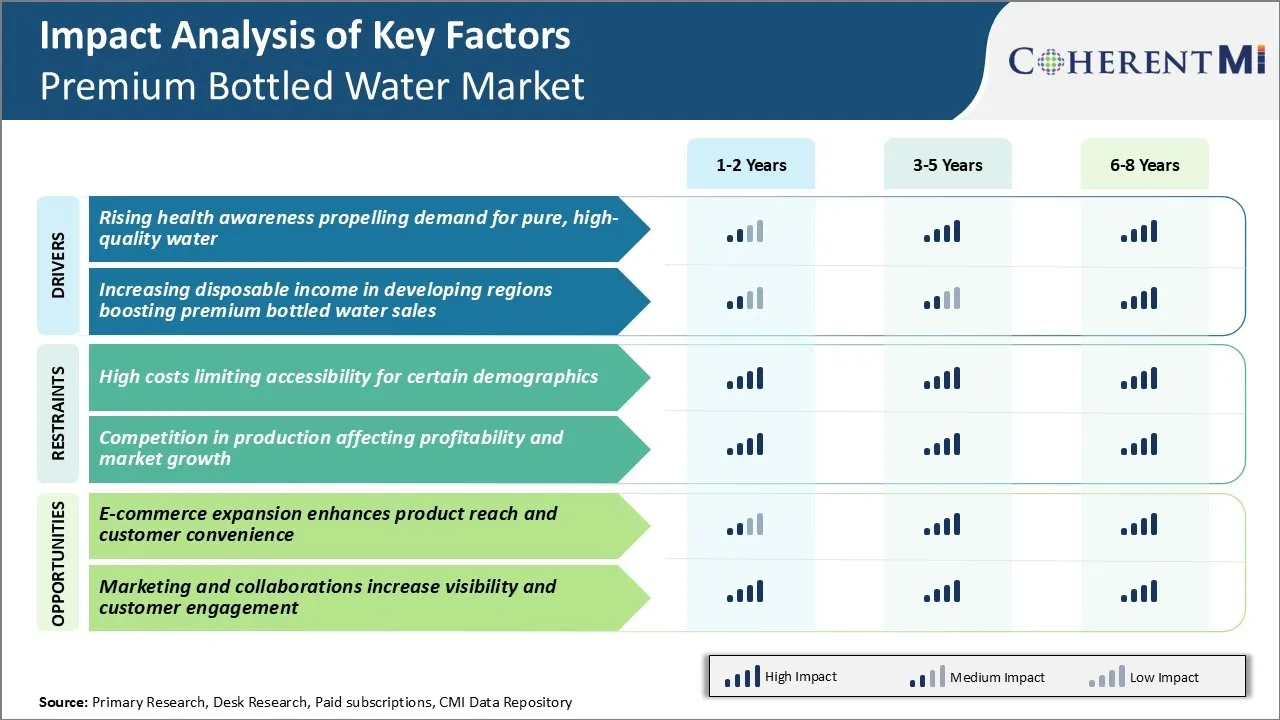Premium Bottled Water Market Trends
Market Driver - Rising Health Awareness Propelling Demand for Pure, High-quality Water
There is a growing perception that bottled water is purer and contains fewer contaminants than tap water which comes through aging pipelines. Furthermore, people want to avoid potential long-term health risks and opt for water that has undergone rigorous purification processes.
Companies in the premium bottled water market promote their products as offering mineral-rich formulas that can balance electrolytes and hydrate the body better. Some brands tout benefits like alkaline properties that may help reduce acidity levels. While the full health benefits of different types of bottled water are still being researched, marketing highlights functional positions and purity to improve customer perception.
The COVID pandemic has further emphasized the need for clean drinking water and boosted hygiene-related spending. Avoiding public water fountains and points during the crisis drove more people to trusted bottled water options. Some prefer them as a safeguard for their families with concerns around virus transmission through shared water infrastructure. With greater awareness about strengthening immunity through diet and hydration habits, premium variants satisfying purity and quality requirements are gaining traction. This will drive growth of the premium bottled water market.
Market Driver - Increasing Disposable Income in Developing Regions Boosting Premium Bottled Water Sales
Rising economic growth has improved living standards and spending power in developing nations over the past decade. While bottled water was earlier considered a luxury confined to the affluent, wider availability of high-paying employment opportunities has made it accessible to a broader segment.
Domestic markets in developing economies are becoming more lucrative. So, leading companies in the global premium bottled water market have amplified their focus on marketing and distribution within priority growth territories. Aggressive in-country investments and manufacturing expansion allow suitable product localization to cater local tastes. Local production also helps optimize costs to offer premium variants at competitive price-points relatable to the regional spending ability. Partnerships with modern retail chains ensure extensive penetration into lower-tier cities and towns witnessing substantial income gains.
Changing consumption patterns signal preference shifts towards convenient packaged and ready-to-consume items rather than traditional sources as a symbol of progress. This continues stimulating growth for premium bottled water market in dynamically evolving developing regions.

Market Challenge - High Costs Limiting Accessibility for Certain Demographics
The premium bottled water market faces the challenge that high product costs can limit its accessibility for certain demographic segments. Restricted affordability translates into the fact that addressable premium bottled water market is confined to middle-to-high income households who can justify the premium.
However, by not being affordable for mass consumption, the total potential market size may be capped compared to other beverage categories. The industry will need to consider strategies such as targeted pricing or package formats to expand its demographic base and tap into wider demand pools.
Another barrier is that value consciousness has grown amid economic uncertainties, making consumers across segments more reluctant to pay premiums without clear functional benefits. Focused communication of the brand image and purity advantages will be important to justify the price-quality proposition.
Market Opportunity - E-commerce Expansion Enhances Product Reach and Customer Convenience for Market
The premium bottled water market possesses an opportunity to expand its reach and enhance customer convenience through increasing penetration of e-commerce sales channels. As more consumers conduct groceries and other purchases online, e-commerce platforms offer an accessible new avenue for premium bottled water brands to meet customer needs. Especially for time-pressed demographics, the ease and safety of digital purchasing can help drive trials and repeat sales.
E-commerce also helps brands surmount logistical and geographic challenges in physical distribution as online networks allow broad, even nationwide delivery coverage. Players in the premium bottled water market must implement strategies with optimized online branding, engaging subscription options, and logistic efficiency. That way, e-commerce would represent a powerful opportunity for them to access new customers as well as deepen engagement with existing buyers in this evolving marketplace.